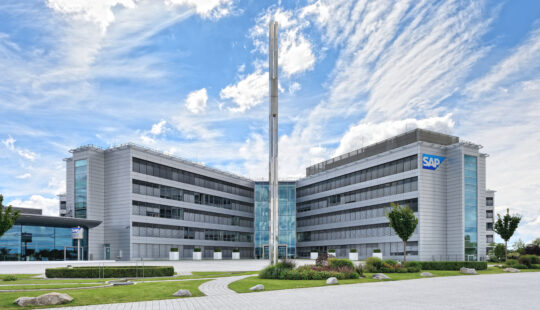A cancer diagnosis can be a shock. First and foremost for the individual and their loved ones, but also for colleagues and managers. Employers can play a key role in helping people live and work with cancer. SAP CEO Christian Klein recently signed the Working with Cancer Pledge to support people working with cancer in the best possible way. What and how people share about their health is a very personal decision; by no means should stigma have a part in this.
When Publicis CEO Arthur Sadoun openly shared his cancer journey he learnt that one in two people were afraid to tell their employers for fear of their jobs, which impelled him to establish the Working with Cancer Pledge. As a cancer survivor, I can fully relate to the emotional roller coaster of coming to terms with the diagnosis, treatment, and returning to work. Like Arthur, I chose to share my journey publicly, as I was lucky to have supportive managers and an employer who provided me with the support and flexibility I needed to recover. But I had to go through the fear of stigma, my professional future, and the feeling of letting my team down.
One in 10 employees will be affected by cancer during their work life.
Health and illness are very personal matters, but dealing with it in the workplace does not and should not need to be a private issue. When someone is scared for their health or even their life, they should not be worrying about stigma or negative consequences of sharing with their employers. On the contrary, it is essential to recovery to manage their energy, feel comfortable to express their needs in the workplace, and find the support they need at any stage of their journey.
Leaders feel unprepared to support chronically ill employees.
A study of more than 1,000 working individuals in the U.S. revealed that 60% believe their leaders are unprepared to support employees with a serious and/or chronic medical condition, and nearly 90% are concerned about their own abilities to offer support. Much of this unpreparedness comes from a lack of awareness, understanding, and effective tools. As a result, a behavior that is rooted in discomfort and helplessness can easily be perceived as stigma.
Break the Stigma
Destigmatizing health and disease have been at the core of health management at SAP for decades. Three years ago, we launched the Are Uou OK? mental health initiative to put a spotlight on mental health conditions and encourage people to share how they are and seek support when needed. This notion should be just as true for serious and chronic diseases, like cancer.
I am proud that Christian Klein signed the pledge to provide a more supportive and recovery-forward culture at work for people with cancer, specifically to:
- Create awareness through regular internal campaigns for cancer prevention and screening, as well as a healthy lifestyle
- Break the stigma through showcasing employee stories to help others speak up
- Provide comprehensive support through access to medical coverage, emotional counseling, flexible working conditions, practical support for day-to-day life, and a supporting return-to-work program when the time is right for them
We want our people to do what’s best for them — because what’s best for our people is best for our business.
It is a journey, and we have come a long way. It is my personal mission that at SAP everyone affected with a serious condition is comfortable to express what they need, and that the affected individual, their manager, and colleagues get the support they need to make the best out of the situation — offering the time and support for recovery while ensuring a structured and supported return-to-work process once they are ready to come back.
Based on SAP’s leadership principles, “be ethical” and “do what’s right,” together we can fight stigma and help make workplaces inclusive and supportive for all.
Dr. Natalie Lotzmann is chief medical officer of SAP SE and global head of Health, Safety & Well-Being, powered by SAP Future of Work.



